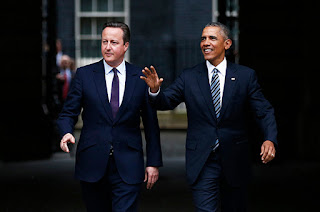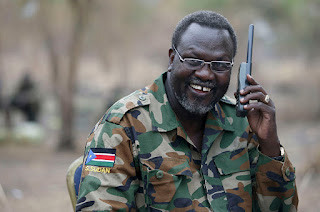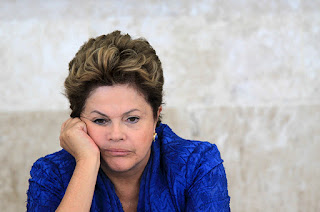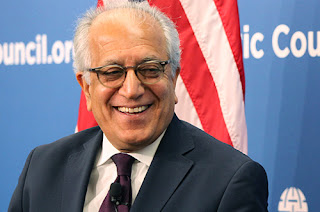Donald Trump: A ‘Dangerous’ Man R. Nicholas Burns, an Atlantic Council board director who served as the State Department’s number three official in the George W. Bush administration, offered a searing critique of Republican presidential frontrunner Donald Trump’s April 27 foreign policy speech in an interview with the New Atlanticist’s Ashish Kumar Sen. Burns is currently a visiting fellow at the Hoover Institution at Stanford University and an advisor to Hillary Rodham Clinton's presidential campaign.* Here are excerpts from our interview.
Posts
Showing posts from April, 2016
- Get link
- X
- Other Apps
US-India Relationship: Playing Defense As the United States and India set out to realize their goal of elevating annual bilateral trade to $500 billion over the next decade, deeper defense cooperation will be key to energizing a trade relationship that has “plateaued,” two senior US Senators said at the Atlantic Council on April 25.
- Get link
- X
- Other Apps
Putting TTIP on Hold Would be a ‘Mistake’ A transatlantic trade deal, currently being negotiated by the United States and the European Union, is critical to improving existing standards on issues such as public health, environmental regulations, and labor and safety issues, according to a new Atlantic Council report.
- Get link
- X
- Other Apps

To B or Not to B? Obama Steps into Brexit Debate US President Barack Obama’s forceful, and unusual, call for the United Kingdom not to leave the European Union reflects a combination of Washington’s unease over the possibility of a Brexit and its big stake in the outcome of the vote, according to the Atlantic Council’s Fran Burwell. British Prime Minister David Cameron and US President Barack Obama leave Number 10 Downing Street, the Prime Minister’s official residence, in London on April 22. (Reuters/Peter Nicholls)
- Get link
- X
- Other Apps

South Sudan: Paging Dr. Riek Riek Machar’s failure to return to Juba this week to take up his duties as Vice President of South Sudan has been met with statements of dismay from the international community, but his no-show should come as no surprise, said the Atlantic Council’s J. Peter Pham. Riek Machar’s failure to return to South Sudan’s capital, Juba, to take up his duties as Vice President has raised questions about the durability of a peace agreement he signed with President Salva Kiir. (Reuters/Goran Tomasevic)
- Get link
- X
- Other Apps
‘Vague’ Requests for Help Will Hinder Effort to Stabilize Libya Vague requests for assistance by the United Nations-backed government in Libya will undermine Western governments’ ability to stabilize the North African nation that has been plunged in chaos since the ouster of its longtime leader Moammar Gadhafi in 2011, according to the Atlantic Council’s Karim Mezran.
- Get link
- X
- Other Apps
US Disengagement from Middle East ‘Raises a Question About American Values’ On the eve of the US-Gulf Cooperation Council (GCC) summit in Riyadh on April 21, Ebtesam Al-Ketbi, President of the Emirates Policy Center in Abu Dhabi, discusses key challenges in the United States’ relationship with its Arab Gulf partners, the cost of US disengagement, and the Iranian threat.
- Get link
- X
- Other Apps

Road to Riyadh: Bridging the Gulf As US President Barack Obama prepares to attend a summit with Gulf Cooperation Council leaders in Riyadh on April 21, the Atlantic Council’s Barry Pavel has some words of advice: The United States must not be neutral in its relationships with its Arab Gulf partners and Iran. US President Barack Obama (center) hosted the six-nation Gulf Cooperation Council (GCC) at Camp David in Maryland on May 14, 2015. From left are United Arab Emirates’ Crown Prince Sheikh Mohammed bin Zayed al-Nahyan; Bahrain’s Crown Prince Salman bin Hamad Al-Khalifa; Oman’s Deputy Prime Minister Sayyid Fahd bin Mahmoud Al Said; the Emir of Kuwait, Sheikh Sabah Al-Ahmed Al-Jaber Al-Sabah; the Emir of Qatar, Sheikh Tameem bin Hamad Al Thani; Saudi Crown Prince Mohammed bin Nayef; and GCC Secretary General Abdul Latif bin Rashid Al Zayani. (Reuters/Kevin Lamarque)
- Get link
- X
- Other Apps

In Brazil, Is Impeachment the Answer? A series of missteps, mismanagement, and misfortunes have brought Brazilian President Dilma Rousseff to the threshold of the fate she now faces: impeachment. Brazil’s President, Dilma Rousseff, is facing impeachment following a vote in the lower house of Congress on April 17. (Reuters/Ueslei Marcelino)
- Get link
- X
- Other Apps
Norway’s Foreign Minister: Migrant Crisis Underscores Need to Prevent Fragile States Turning into Failed States The migrant crisis straining Europe and security challenges in North Africa and the Middle East have made it imperative for a concerted effort to prevent fragile states from becoming failed states, Norway’s Foreign Minister, Børge Brende, said on April 14.
- Get link
- X
- Other Apps
Millions in Nigeria are Starving, Warns UN Official Millions of people are starving in northeastern Nigeria and efforts to reach out to Boko Haram—the Islamist militant group directly responsible for their plight—to ensure a space to deliver humanitarian aid have been met by silence, a senior United Nations official said on April 15.
- Get link
- X
- Other Apps

US Foreign Policy Needs to be ‘Balanced’ Between ‘Great Exertions’ and ‘Retreat’ Zalmay Khalilzad served as the US Ambassador to Iraq, Afghanistan, and the United Nations in the George W. Bush administration. A member of the Atlantic Council’s Board of Directors, Khalilzad has recently authored an insightful and widely praised memoir— The Envoy . In a wide-ranging interview with the New Atlanticist’s Ashish Kumar Sen, he discussed the lessons learned from the US experiences in Afghanistan and Iraq, prospects for peace with the Taliban, and US diplomacy in a post-Iran nuclear deal Middle East, among other issues. "The right lesson to learn from Iraq and Afghanistan is that big projects such as these two need to be done very selectively and rarely, we also need to recognize that we might have to do them again,” said Zalmay Khalilzad, a former US Ambassador to Afghanistan and Iraq. Khalilzad is a member of the Atlantic Council’s Board of Directors. (Atla...
- Get link
- X
- Other Apps
Albania’s Prime Minister Edi Rama: Enlargement a Secondary Priority for the European Union A combination of economic, security, and migration challenges facing Europe could “fuel instability in the Western Balkans” and “bring more uncertainty to the south and east,” Albania’s Prime Minister, Edi Rama, said on April 13.
- Get link
- X
- Other Apps
NATO Secretary General Stoltenberg Stands Up for the Alliance NATO Secretary General Jens Stoltenberg refused to wade into US domestic politics, but he delivered a forceful defense of the Alliance on April 6 in remarks that may be interpreted as a firm rebuttal to Republican presidential frontrunner Donald Trump’s criticism of the grouping as “obsolete.” Noting that the mutual interests of the United States and Europe are best served by a strong North Atlantic alliance, Stoltenberg said: “Without NATO, transatlantic cooperation would be weaker, Europe and North America less safe, and the world a more dangerous place.”
- Get link
- X
- Other Apps
No, Europe, Migrants Are Not Stealing Your Jobs Contrary to the rhetoric from some politicians, there is very little evidence that migrants take jobs away from host populations, and in Europe, where some countries have low to negative population growth, migration should be seen as a boon, according to an International Monetary Fund study.
- Get link
- X
- Other Apps
Distract, Deceive, Destroy: Atlantic Council Report Exposes Putin’s Deceptions in Syria A new Atlantic Council report uses open-source data to debunk Russian claims that its military mostly struck Islamic State of Iraq and al-Sham (ISIS) targets, and links Russia to attacks on civilian facilities and the use of cluster bombs in Syria. So why haven’t Western governments that have more sophisticated intelligence capabilities employed similar technologies and techniques to counter Russian propaganda?